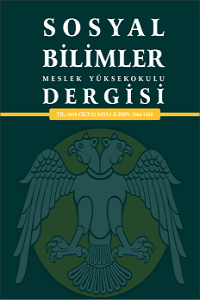Abstract
Bu çalışmanın amacı, göç konusuyla ilgili bazı kavramlara
değinmekle birlikte göçmenlerin Avrupa’ya ulaşmak amacıyla kullandıkları yasa
dışı göç rotasını incelemek ve Avrupa, İtalya ve Türkiye’nin bu soruna yönelik
çözüm önerilerini ortaya koymaktır. Bu konu bağlamında çalışmada dünyadaki
göçmen durumuyla ilgili Birleşmiş Milletler (BM) raporları incelenmiş ve
göçmenlerle ilgili sayısal verilere yer verilmiştir. Ayrıca Türkiye’deki
Suriyeli göçmenlerin durumuna da değinilerek göçmen, mülteci ve sığınmacı gibi birbiriyle
karışan kavramların farkı belirtilmiştir. Yasa dışı göçün en önemli
unsurlarından olan göçmen kaçakçılığı suçunun Türk ve İtalyan kanunlarına göre
ceza durumuna ve İtalya’da 2002 yılında değişen göç kanunlarının göçmen
kaçakçılığı açısından değişen hüküm ve sonuçlarına yer verilmiştir. Avrupa’ya
ulaşmak amacıyla kullanılan en yaygın kaçakçılık hatları ve rotaları incelenmiş
ve Akdeniz’de rotalara göre gerçekleşen ölüm oranlarına değinilmiştir. Yine
Avrupa ve İtalya’nın bu bölgede kaçakçılığı önlemek için yaptığı çalışmalar
araştırılmıştır. Zira İtalya, Avrupa’nın yürüttüğü Frontex’ten farklı olarak
‘’Mare Nostrum’’ ve ‘’Constrant Vigilance’’ gibi kendi operasyonlarıyla bölgede
faaliyetler yürütmektedir. Bölgede yapılan birçok operasyona rağmen, istenilen
başarı sağlanamamıştır. Sonuç olarak özellikle İtalya üzerinden gerçekleşen
rotada son yıllarda meydana gelen ölümler ciddi oranda artmış ve Akdeniz
zamanla ölüm denizi haline gelmiştir. Son tahlilde, ölümlerinin engellenmesi
için çözüm önerileri üzerinde durulmuştur.
Keywords
References
- Aarstad, Å. K. (2015). The Duty to Assist and Its Disincentives: The Shipping Industry and the Mediterranean Migration Crisis. Mediterranean Politics, 20 (3), 413-419.
- Aziz, A., Monzini, P., Pastore, F. (2015). The changing dynamics of cross-border humans muggling and trafficking in the Mediterranean. Rome: IAI.
- Carrera, S., Den Hertog, L. (2015). Whose Mare? Rule of lawchallenges in thefield of Europeanbordersurveillance in theMediterranean. CEPS Liberty and Security in Europe No. 79/January 2015.
Abstract
The purpose of this study is to related some of the terms
associated with migration case and to analyze the illegal migration flow which
is caused by the immigrants who wants to reach Europe. This article will also
seek out the solutions created by Europe and finally it will reveal the missing
aspects of rescue operations carried out by Europe, Italy and Turkey
themselves. Relevant to this issue the United Nations' report on the World
migration case has been analyzed and digital data has been given regarding the
migrants. Moreover, the case of Syrians living in Turkey touched on and
distinguished some terms such as migrant, refugee and asylum seeker which can be
sometimes confusing. The migrant smuggling crime as one of the most significant
element of illegal migration and the punishment case according to Turkish and
Italian laws and the changes provision and consequences of the changed
migration law have been mentioned in the aspects of migrant smuggling in Italy
in 2002. The most common used smuggling
route and line in order to reach to Europe has been focused on as well as the
death rates, according to the Mediterranean routes which were examined in the
study. Some efforts that conducted by Europe and Italy to prevent smuggling in
this region have been analyzed. According to the findings of this study, Italy
is conducting its own activity in the region such as ‘'Mare Nostrum'' and
‘'Constant Vigilance'' operations unlike Europe's Frontex operation but, in
contrast with many operations in the region, the targeted success was not
reached out. As a result, this case has profoundly increased the death rates
especially the route of Italy which eventually led the Mediterranean sea called
‘'Death Sea’’. In the final analysis, the numerical death rate and solution
offers in order to decrease this rate, has been reported.
Keywords
References
- Aarstad, Å. K. (2015). The Duty to Assist and Its Disincentives: The Shipping Industry and the Mediterranean Migration Crisis. Mediterranean Politics, 20 (3), 413-419.
- Aziz, A., Monzini, P., Pastore, F. (2015). The changing dynamics of cross-border humans muggling and trafficking in the Mediterranean. Rome: IAI.
- Carrera, S., Den Hertog, L. (2015). Whose Mare? Rule of lawchallenges in thefield of Europeanbordersurveillance in theMediterranean. CEPS Liberty and Security in Europe No. 79/January 2015.
Details
| Primary Language | Turkish |
|---|---|
| Journal Section | Konferans Bildirisi |
| Authors | |
| Publication Date | April 30, 2019 |
| Submission Date | February 6, 2019 |
| Published in Issue | Year 2019 Volume: 22 Issue: 1 |
Cited By
Praise for Crime in Digital Networks: An Analysis on Social Media for Social Awareness of Immigrant Smuggling
Uluslararası İnsan Çalışmaları Dergisi
https://doi.org/10.35235/uicd.996831
Akdeniz’de Düzensiz Göçler ve Göçmenler: Terraferma Filmi Örneği
Sosyolojik Bağlam Dergisi
Elif GÜN
https://doi.org/10.52108/2757-5942.2.1.4
Journal of Selçuk University Social Sciences Vocational School is licensed under a Creative Commons Attribution-NonCommercial 4.0 International License (CC BY NC).


